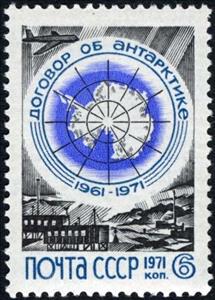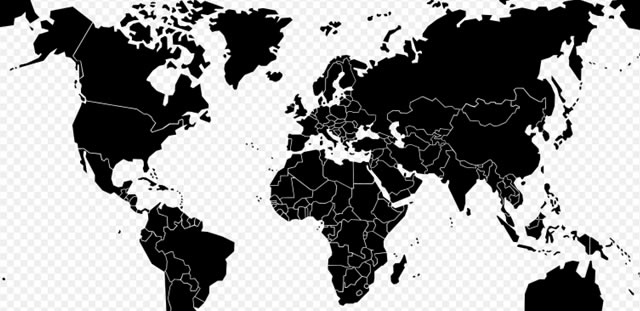Stamp: 10th Anniversary of Antarctic Treaty (Soviet Union, USSR 1971)
10th Anniversary of Antarctic Treaty (Soviet Union, USSR 1971)
21 June (Soviet Union, USSR ) within release 10th Anniversary of Antarctic Treaty goes into circulation Stamp 10th Anniversary of Antarctic Treaty face value 6 Russian kopek
| Stamp 10th Anniversary of Antarctic Treaty in catalogues | |
|---|---|
| Michel: | Mi:SU 3890 |
| Yvert et Tellier: | Yt:SU 3727 |
Stamp is vertical format.
Also in the issue 10th Anniversary of Antarctic Treaty:
- Stamp - 30th Anniversary of Defence of Liepaja. face value 4;
- Stamp - 10th Anniversary of Antarctic Treaty face value 6;
- Stamp - 50th Anniversary of Hydrometeorological Service. face value 10;
- Stamp - 20th Anniversary of Internationale Federation of Resistance. face value 6;
Stamp 10th Anniversary of Antarctic Treaty it reflects the thematic directions:
A map is a symbolic depiction emphasizing relationships between elements of some space, such as objects, regions, or themes. Many maps are static, fixed to paper or some other durable medium, while others are dynamic or interactive. Although most commonly used to depict geography, maps may represent any space, real or imagined, without regard to context or scale, such as in brain mapping, DNA mapping, or computer network topology mapping. The space being mapped may be two dimensional, such as the surface of the earth, three dimensional, such as the interior of the earth, or even more abstract spaces of any dimension, such as arise in modeling phenomena having many independent variables. Although the earliest maps known are of the heavens, geographic maps of territory have a very long tradition and exist from ancient times. The word "map" comes from the medieval Latin Mappa mundi, wherein mappa meant napkin or cloth and mundi the world. Thus, "map" became the shortened term referring to a two-dimensional representation of the surface of the world.
Exploration is the process of exploring, an activity which has some expectation of discovery. Organised exploration is largely a human activity, but exploratory activity is common to most organisms capable of directed locomotion and the ability to learn, and has been described in, amongst others, social insects foraging behaviour, where feedback from returning individuals affects the activity of other members of the group.
A treaty is a formal, legally binding written agreement between sovereign states and/or international organizations that is governed by international law. A treaty may also be known as an international agreement, protocol, covenant, convention, pact, or exchange of letters, among other terms; however, only documents that are legally binding on the parties are considered treaties under international law. Treaties may be bilateral (between two countries) or multilateral (involving more than two countries).
An anniversary is the date on which an event took place or an institution was founded in a previous year, and may also refer to the commemoration or celebration of that event. For example, the first event is the initial occurrence or, if planned, the inaugural of the event. One year later would be the first anniversary of that event. The word was first used for Catholic feasts to commemorate saints. Most countries celebrate national anniversaries, typically called national days. These could be the date of independence of the nation or the adoption of a new constitution or form of government. The important dates in a sitting monarch's reign may also be commemorated, an event often referred to as a "Jubilee".




